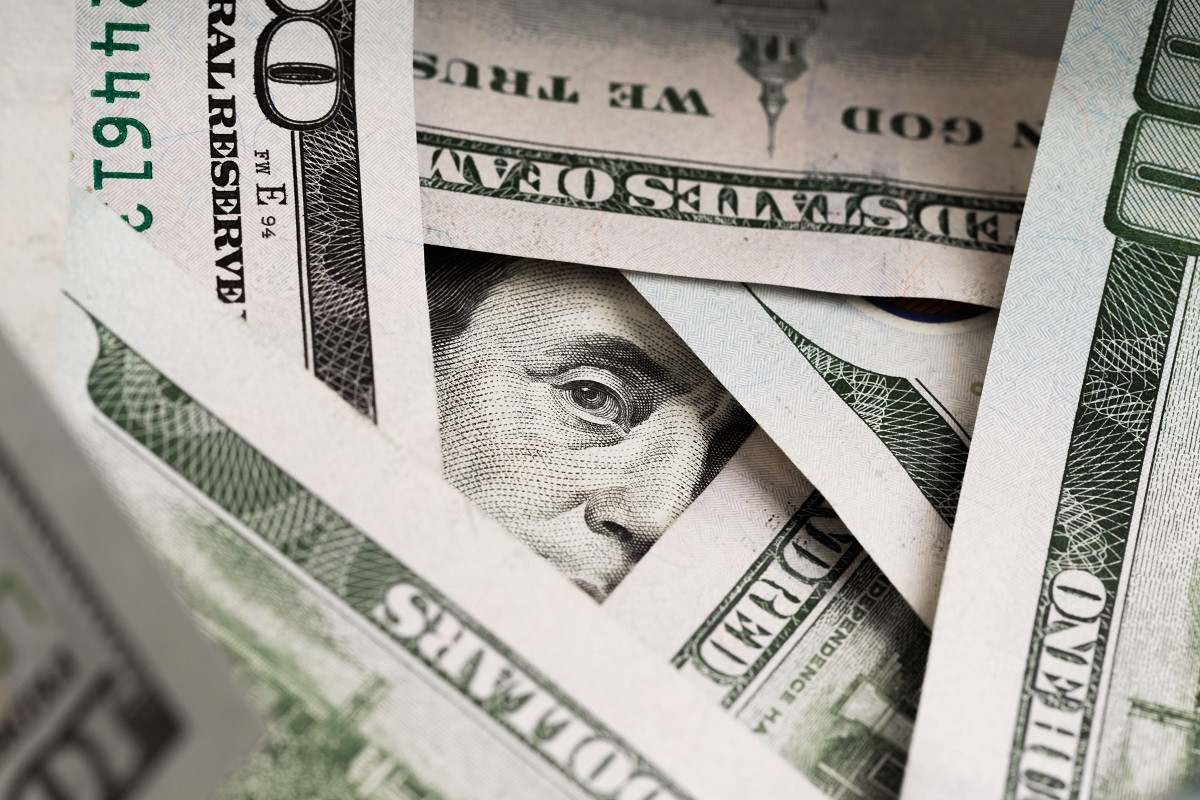
The steep fall of the US dollar mirrors growing market anxiety, even though sudden sell-offs are considered less risky than gradual ones. The concern stems from renewed fears of a potential recession in the US economy.
The main precursor to looming economic troubles is the exit of the yield curve from its inverted state and the elevated federal funds rate. Together, these factors point to an approaching hard landing for the economy, strengthening the arguments for decisive action by the Federal Reserve.
The US dollar index plummeted, briefly dipping below 102.2 points. It has since rebounded above 103 points.
Support levels: 102.50, 102.20, 102.00
Resistance levels: 103.00, 103.50, 104.00
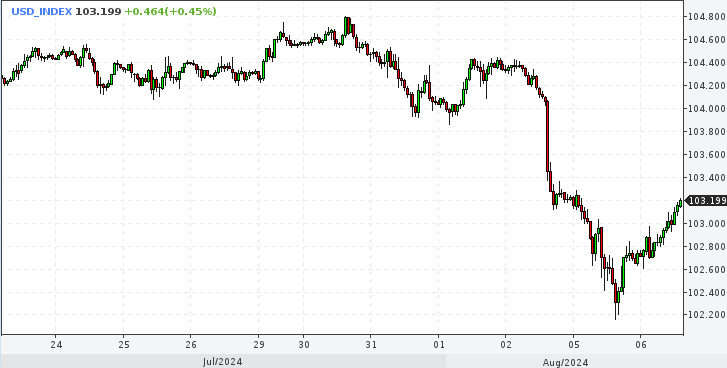
US dollar rises from ashes
Tuesday brought an upward correction. EUR/USD climbed to 1.1000 on Monday and corrected to 1.0910 today. The Japanese yen, which strengthened to 142.0 against the US dollar on Monday, weakened to 145.0 today. However, high volatility in currency pairs is expected to persist throughout this week and possibly the next.
Recent weak employment data and poor PMIs from the US have raised concerns about the conditions in the world's largest economy, increasing the likelihood of a resolute rate cut by the Federal Reserve in September. This has especially affected the yield on 10-year US Treasury bonds, which fell to 3.75%, contributing to the greenback's weakness.
At the beginning of the week, amidst the slump in the US stock market, traders started to factor in a rate cut of almost 115 basis points until the year end. The probability of a 50-basis-point rate cut in September increased to nearly 92% on Tuesday from 12% last week.
An interesting moment occurred in July when the Fed insisted on a prolonged period of high interest rates, while the Bank of Japan kept its rates near zero, leading to a record rise in the USD/JPY pair to 162.0 – the highest in 38 years.
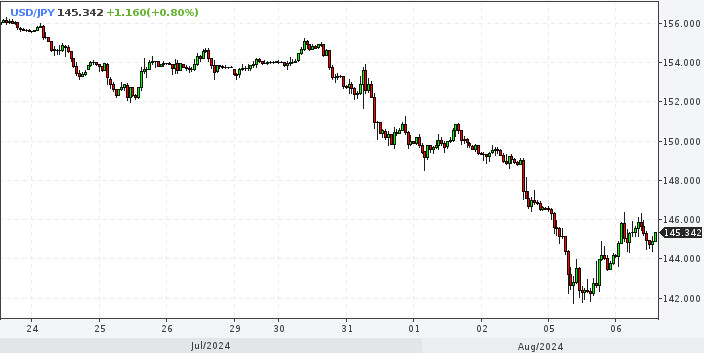
However, in late July and early August, the Bank of Japan tightened its monetary policy. Combined with weak US data, this caused the USD/JPY pair to sink from 154 to 142.
This forced traders to urgently close their carry trade positions with the yen, as shown by last week's CFTC data, where bearish bets on the yen fell to $6 billion from a nearly decade-high of $14.5 billion noted in April.
Yen strengthens, putting pressure on global stock markets
The significant strengthening of the Japanese yen affected Japan's stock market, subsequently leading to declines in US and European stock markets.
Analysts had already anticipated such an outcome in light of some reports indicating easing economic growth both in the US and the EU as well as dismal second-quarter corporate earnings reports. Sliding commodity and oil prices also fit this scenario, making it likely that stock and commodity markets will close August in the red.
In light of the weaker-than-expected July employment data, Federal Reserve policymakers made statements denying that the domestic economy is in recession. However, they acknowledged that the Federal Reserve would need to cut interest rates to avert a recession scenario.
Goldman Sachs analysts raised the probability of a US recession next year from 15% to 25%. At the same time, they pointed to factors that could help avoid an economic downturn.
In this context, the main risks for the markets include the possibility of the US economy shifting from a soft landing to a recession. Additionally, increasing domestic political tensions ahead of the US presidential elections and fears of a full-scale conflict in the Middle East add uncertainty to the dynamics of risky asset and currency markets.
Snapshot of US economy after weak nonfarm payrolls
The downbeat US labor market report published on Friday increased bets on a sharp rate cut by the end of the year. Despite this, analysis shows that the situation in the American economy may not be as alarming as it appears.
The unemployment rate reached a high of 4.3% since October 2021. Besides, the NFPs revealed weak hiring in July. However, the acceleration of US GDP growth in the second quarter of 2024 indicates that the economy is still growing.
Importantly, labor market reports are often subject to significant revisions, which can alter the initially negative picture. Therefore, a sharp rate cut by the Federal Reserve could cause additional market instability, reinforcing investors' fears about a worsening economic situation.
The recovery of business activity in the US services sector also confirms the mixed nature of the current economic situation. The ISM Services PMI for July rose to 51.4, indicating moderate recovery. Additionally, new orders and business activity indices also showed improvement, casting doubt on the pessimistic conclusions drawn from the nonfarm payrolls.
Market attention is now focused on new economic data, including retail sales in the eurozone and the US trade balance, as well as the US Energy Department's short-term energy outlook.
Eurozone retail sales slipped by 0.3% year-on-year in June after a 0.5% increase in May, defying the market consensus of +0.1%. Retail sales declined by 0.3% month-on-month over the same period, compared to expectations of +0.1%.
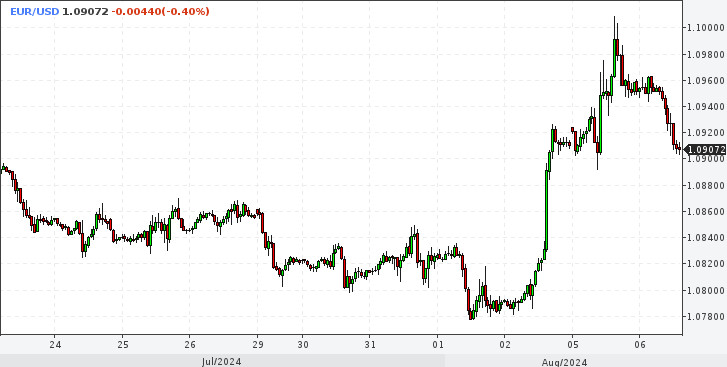
The pessimistic eurozone data keeps the euro under moderate selling pressure. This dynamic is unlikely to be sustained. Following the recent drop in the US dollar index to March lows (102.3) and the subsequent rebound, the instrument is set to trade under high volatility, possibly followed by a new bearish wave of the US dollar.
Currency analysts from UOB Group believe that the euro will still assert its strength. If the EUR/USD pair settles above the support level of 1.0910, there is a good chance of retesting the resistance level of 1.1010. Breaking through this threshold will be key to further strengthening the euro with the potential rise to 1.1070.
Therefore, investors and traders should closely monitor the euro's movement relative to these key levels to formulate strategies based on these technical markers.
What to expect from pound sterling
The British pound is also under pressure today amid the dollar's recovery. There is generally increased interest in the British pound from traders. GBP/USD is near the lower border of the upward channel on the daily chart. Historically, this has served as a good buying opportunity, as a return to this level often attracts buyers' attention.
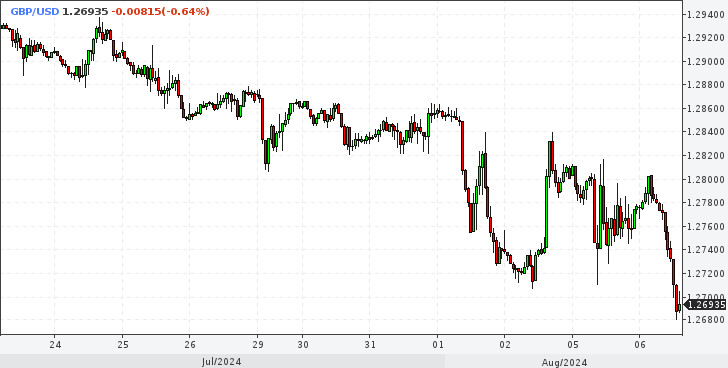
After the GBP/USD pair fell below the important psychological support level of 1.2900, we are now watching a pullback, highlighting the current short-term uncertainty.
GBP/USD is near the 50-day exponential moving average (EMA) around 1.2790, a critical point for determining a further trajectory.
The 14-day relative strength index (RSI) has dropped to around 40, which may provide some support to the momentum oscillator and prevent further decline.
In terms of support, the round level of 1.2800 is an important zone for bullish interest in GBP/USD. If the price breaks upwards, the next significant target will be the resistance area around the two-year high at about 1.3140.





















